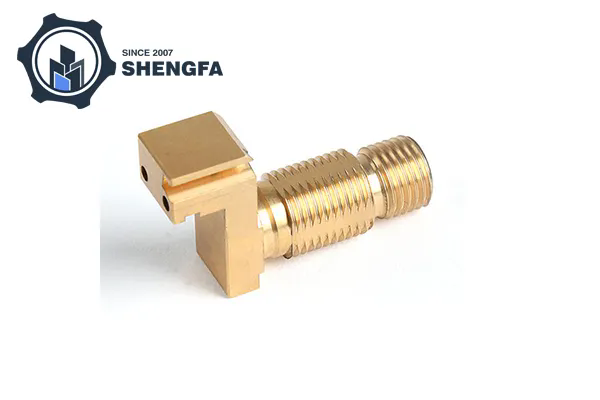Precision and Excellence: The Benefits of Brass CNC Machining Services
2024-08-15
In the world of manufacturing and engineering, precision and quality are paramount. Brass CNC (Computer Numerical Control) machining services have become a cornerstone for producing high-quality brass components with exceptional accuracy and consistency. This advanced machining technique is widely used across various industries, from aerospace and automotive to electronics and consumer goods. In this blog, we will explore the advantages of brass CNC machining services, their applications, and how they contribute to the success of modern manufacturing.
1. What is Brass CNC Machining?
Brass CNC machining refers to the process of using computer-controlled machinery to cut, shape, and finish brass materials into precise components and parts. CNC machining involves programming a computer to control the movement of cutting tools, allowing for highly accurate and repeatable production. Brass, an alloy primarily composed of copper and zinc, is known for its machinability, durability, and aesthetic appeal, making it a popular choice for a wide range of applications.
2. Key Features of Brass CNC Machining Services
Brass CNC machining services offer several key features that make them suitable for producing high-quality brass components:
- High Precision: CNC machining ensures exceptional accuracy and consistency in the production of brass components. The computer-controlled process allows for tight tolerances and precise measurements, resulting in high-quality parts.
- Complex Geometries: CNC machines can handle intricate and complex geometries that would be challenging to achieve with traditional machining methods. This capability allows for the production of detailed and customized brass components.
- Automated Production: CNC machining is highly automated, reducing the need for manual intervention and minimizing the risk of human error. This automation results in faster production times and increased efficiency.
- Versatility: Brass CNC machining can accommodate a wide range of brass alloys and grades, allowing for the production of various types of components with different properties and characteristics.
- Consistent Quality: The precision and repeatability of CNC machining ensure that each brass component meets the same high standards of quality, making it ideal for applications where consistency is crucial.
3. Benefits of Brass CNC Machining Services
The adoption of brass CNC machining services offers several significant benefits to manufacturers and businesses:
- Enhanced Accuracy: The computer-controlled nature of CNC machining provides superior accuracy and precision compared to manual machining methods. This results in components that meet exact specifications and tolerances.
- Increased Efficiency: CNC machines can operate continuously and at high speeds, leading to increased production efficiency and shorter lead times. This efficiency is essential for meeting tight deadlines and high-volume production requirements.
- Cost-Effectiveness: While the initial investment in CNC machinery can be substantial, the long-term cost savings are significant. Reduced material waste, faster production times, and lower labor costs contribute to overall cost-effectiveness.
- Customization and Flexibility: CNC machining allows for the customization of brass components to meet specific design requirements. The flexibility of CNC machines enables the production of both small and large quantities of parts with varying complexities.
- Superior Surface Finish: CNC machining can achieve high-quality surface finishes, reducing the need for additional post-processing. This results in components with a smooth and polished appearance.
- Durability and Reliability: Brass is known for its strength and durability, and CNC machining enhances these properties by producing components with precise dimensions and high structural integrity.
4. Applications of Brass CNC Machining
Brass CNC machining services are used across a wide range of industries and applications:
- Aerospace: In the aerospace industry, brass components are used in critical applications such as fittings, connectors, and valves. CNC machining ensures the precision and reliability required for aerospace components.
- Automotive: Brass CNC machining is employed to produce various automotive parts, including fittings, housings, and connectors. The durability and machinability of brass make it suitable for demanding automotive applications.
- Electronics: Brass components are commonly used in electronic devices for connectors, terminals, and housings. CNC machining provides the precision needed for small and intricate electronic parts.
- Industrial Machinery: Brass CNC machining is used to produce components for industrial machinery, including gears, valves, and bushings. The strength and wear resistance of brass make it ideal for these applications.
- Consumer Goods: Brass is used in various consumer goods, such as decorative items, plumbing fixtures, and hardware. CNC machining allows for the creation of high-quality, aesthetically pleasing components.
- Medical Devices: Brass components are used in medical devices for fittings, connectors, and housings. The precision and reliability of CNC machining are crucial for ensuring the functionality and safety of medical equipment.
5. Considerations When Choosing Brass CNC Machining Services
When selecting brass CNC machining services, consider the following factors:
- Capabilities and Expertise: Choose a service provider with experience and expertise in machining brass components. Evaluate their capabilities and the range of services they offer.
- Quality Standards: Ensure that the machining service adheres to high-quality standards and can meet your specific requirements for precision and finish. Look for certifications and quality control processes.
- Technology and Equipment: Assess the technology and equipment used by the machining service. Advanced CNC machinery and up-to-date technology contribute to better performance and results.
- Lead Times and Production Capacity: Consider the lead times and production capacity of the service provider. Ensure that they can meet your deadlines and handle the volume of components you require.
- Cost and Budget: Evaluate the cost of the machining services in relation to your budget. Consider factors such as material costs, labor, and any additional services or post-processing requirements.
- Customer Support: Choose a service provider with good customer support and communication. Reliable support ensures that any issues or questions are addressed promptly.
6. Future Trends in Brass CNC Machining
As technology continues to advance, brass CNC machining services are expected to see several trends and innovations:
- Advanced Materials: The development of new brass alloys and materials may lead to improved performance and capabilities for CNC machining.
- Enhanced Automation: Continued advancements in automation and robotics may further improve production efficiency and reduce costs.
- Integration with Digital Technologies: Integration with digital technologies, such as IoT and data analytics, may provide real-time monitoring and optimization of machining processes.
- Sustainability: There may be a focus on sustainable practices and environmentally friendly processes in brass CNC machining, including recycling and reducing waste.
In conclusion, brass CNC machining services offer a range of benefits, including precision, efficiency, and versatility. By understanding their features and applications, manufacturers can leverage the advantages of CNC machining to produce high-quality brass components that meet the demands of various industries. As technology evolves, brass CNC machining will continue to play a vital role in advancing manufacturing capabilities and driving innovation.



